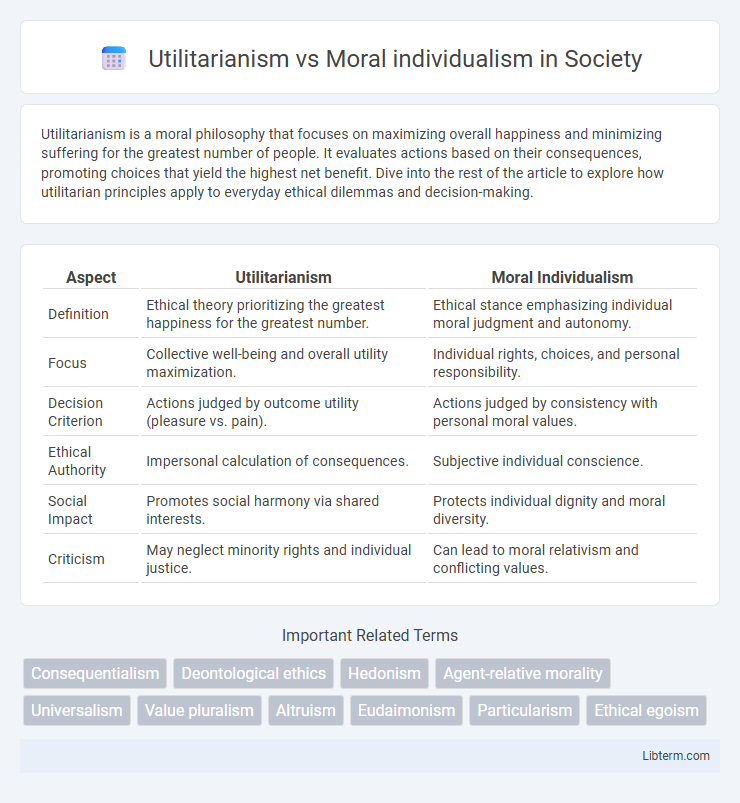Utilitarianism is a moral philosophy that focuses on maximizing overall happiness and minimizing suffering for the greatest number of people. It evaluates actions based on their consequences, promoting choices that yield the highest net benefit. Dive into the rest of the article to explore how utilitarian principles apply to everyday ethical dilemmas and decision-making.
Table of Comparison
| Aspect | Utilitarianism | Moral Individualism |
|---|---|---|
| Definition | Ethical theory prioritizing the greatest happiness for the greatest number. | Ethical stance emphasizing individual moral judgment and autonomy. |
| Focus | Collective well-being and overall utility maximization. | Individual rights, choices, and personal responsibility. |
| Decision Criterion | Actions judged by outcome utility (pleasure vs. pain). | Actions judged by consistency with personal moral values. |
| Ethical Authority | Impersonal calculation of consequences. | Subjective individual conscience. |
| Social Impact | Promotes social harmony via shared interests. | Protects individual dignity and moral diversity. |
| Criticism | May neglect minority rights and individual justice. | Can lead to moral relativism and conflicting values. |
Understanding Utilitarianism: Core Principles
Utilitarianism centers on the principle of maximizing overall happiness or utility by evaluating the consequences of actions to promote the greatest good for the greatest number. It assesses moral rightness based on outcomes, emphasizing impartiality and aggregating individual preferences to achieve collective well-being. This contrasts with moral individualism, which prioritizes the autonomy and rights of the individual over collective consequences in ethical decision-making.
Defining Moral Individualism: Key Concepts
Moral individualism centers on the principle that moral judgments and actions should prioritize the individual's rights, autonomy, and unique circumstances over collective goals. It emphasizes personal responsibility and the intrinsic value of each person's choices, contrasting with utilitarianism's emphasis on maximizing overall happiness or utility. This approach upholds that moral decisions must reflect individual dignity and freedom rather than general welfare metrics.
Historical Background: Origins and Evolution
Utilitarianism originated in the late 18th century, primarily through the works of Jeremy Bentham and John Stuart Mill, emphasizing the greatest happiness principle as a foundation for ethical decision-making. Moral individualism, rooted in Enlightenment thought, evolved as a reaction against collective moral frameworks, championing personal autonomy and individual rights as central ethical concerns. The historical evolution of these concepts reflects a shift from collective utilitarian calculations toward recognition of individual moral agency and intrinsic worth.
Major Philosophers: Influential Thinkers
John Stuart Mill and Jeremy Bentham are pivotal figures in utilitarianism, emphasizing the greatest happiness principle as the foundation of ethical decisions. In contrast, moral individualism is championed by philosophers like Immanuel Kant and Friedrich Nietzsche, who prioritize individual autonomy and moral responsibility over collective welfare. Their divergent philosophies highlight the tension between collective utility and personal moral agency in ethical theory.
Decision-Making: Collective Good vs. Personal Rights
Utilitarianism emphasizes decision-making based on maximizing overall happiness and collective good, often prioritizing societal benefits over individual preferences. Moral individualism centers on respecting personal rights and autonomy, ensuring decisions uphold individual dignity regardless of majority outcomes. Balancing these approaches requires careful evaluation of ethical trade-offs between communal welfare and protection of personal freedoms in practical scenarios.
Real-World Applications: Ethics in Practice
Utilitarianism guides real-world decision-making by emphasizing actions that maximize overall happiness or utility, influencing fields such as public policy, healthcare, and environmental ethics. Moral individualism prioritizes personal autonomy and ethical responsibility, shaping practices in professional settings and legal frameworks where individual rights and personal moral judgments are paramount. Both frameworks critically inform ethical debates over resource allocation, privacy, and justice, underscoring the tension between collective welfare and personal moral agency in practical contexts.
Strengths and Weaknesses of Utilitarianism
Utilitarianism's strength lies in its clear, outcome-oriented framework that promotes maximizing overall happiness and minimizing suffering, making moral decisions straightforward and practical. However, its weaknesses include the potential neglect of individual rights and justice, as the theory prioritizes the majority's welfare, sometimes justifying harmful actions against minorities. The challenges in accurately measuring and comparing happiness further complicate its application in complex ethical dilemmas.
Critiques and Challenges of Moral Individualism
Moral individualism faces critiques for potentially fostering moral isolation by emphasizing personal autonomy at the expense of communal values and social responsibilities. Critics argue this approach can lead to ethical relativism, where individuals prioritize subjective interests, undermining collective moral standards and social cohesion. Challenges include grappling with conflicts between individual rights and societal well-being, often criticized by utilitarianism for insufficiently addressing the consequences of individual actions on overall happiness.
Case Studies: Utilitarianism vs Moral Individualism
Case studies reveal key differences between utilitarianism and moral individualism in ethical decision-making, such as in medical resource allocation during pandemics where utilitarianism prioritizes maximizing overall well-being, often favoring the majority, while moral individualism emphasizes the rights and dignity of each patient regardless of wider outcomes. In business ethics, utilitarian approaches justify actions that enhance overall shareholder value despite individual employee harm, whereas moral individualism demands respect for each worker's autonomy and fair treatment. These case studies demonstrate the tension between collective utility and individual rights, highlighting the importance of context in ethical evaluations.
Future Perspectives: Ethical Paradigms in a Changing World
Utilitarianism emphasizes maximizing overall happiness through collective well-being, while moral individualism prioritizes personal autonomy and individual rights in ethical decision-making. Future perspectives in ethical paradigms increasingly explore hybrid models that integrate utilitarian outcomes with respect for individual moral agency, addressing challenges like AI ethics and climate justice. This evolving discourse shapes policies that balance societal benefits with personal freedoms in a rapidly changing global landscape.
Utilitarianism Infographic

 libterm.com
libterm.com